The Samsung Galaxy Note 4 Review
by Joshua Ho on October 15, 2014 9:00 AM EST- Posted in
- Smartphones
- Samsung
- Android
- Mobile
- Galaxy Note 4
Battery Life
Battery life is one of the most important aspects of any mobile device, especially because the battery is what defines mobility to begin with. As a result, it’s important to test battery life in a meaningful manner. This requires a repeatable test with standardized conditions, and a range of scenarios that stress different aspects to get the full picture. Most importantly, for tests that have the display on we calibrate the display to 200 nits to ensure that the test doesn’t penalize brighter displays. In the case of the Galaxy Note 4, we see about a 3% gain in battery capacity, so most of the battery life gains should come from higher efficiency.
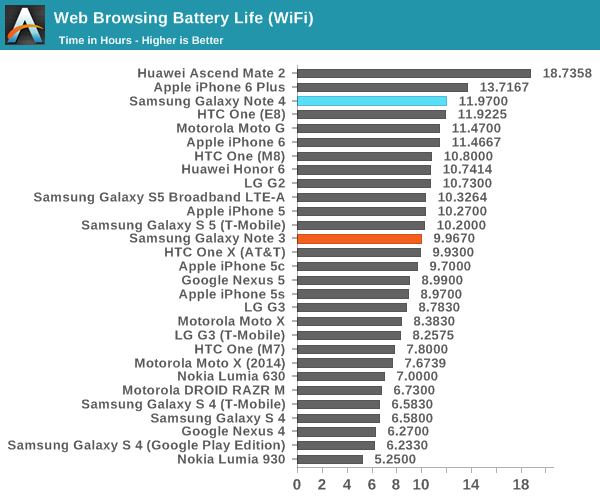
Our first test is the WiFi web browsing test, which loads a given set of web pages in a loop, with special emphasis taken in order to ensure that the test doesn’t penalize faster SoCs, which would have significant effects on our results. As one can see above, the Galaxy Note 4 has a noticeable uplift in battery life when compared to the Galaxy S5 and lasts significantly longer than the Galaxy Note 3. It doesn’t last quite as long as the iPhone 6 Plus, but few people should have issues getting through a full day of intensive use.
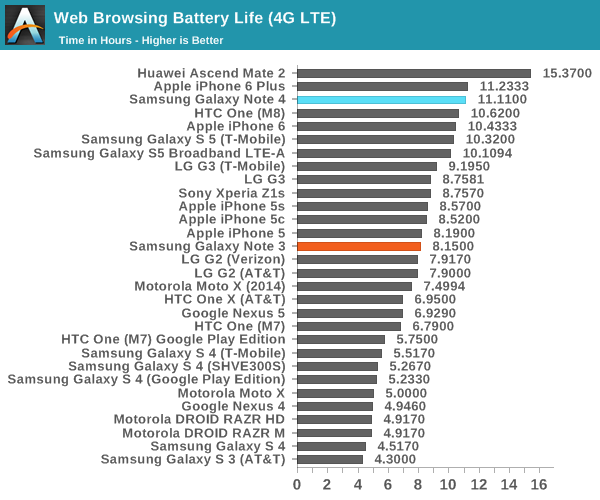
On LTE web browsing, a similar story plays out as the Galaxy Note 4 is able to keep up with the competition and delivers the massive improvement that we’ve generally seen from the transition to Snapdragon 801 and 805.
While the web tests are well-worn by now, we’ve added two additional tests to the battery life suite in order to get a better picture of SoC-bound battery life. To this end, we use an infinite loop of T-Rex on-screen to replicate a GPU-intensive scenario and Basemark OS II’s battery life test to simulate a CPU-intensive scenario.
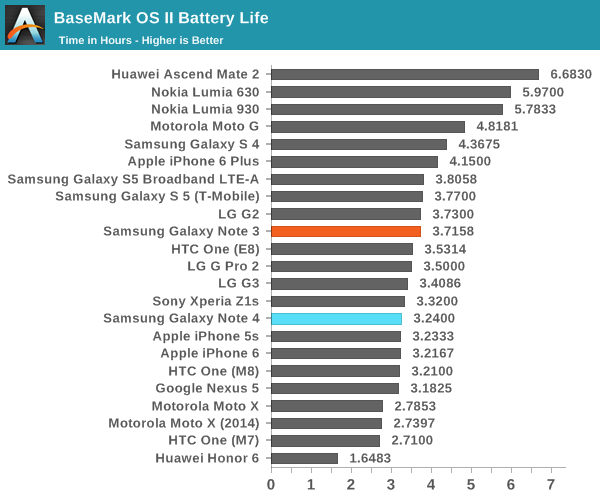
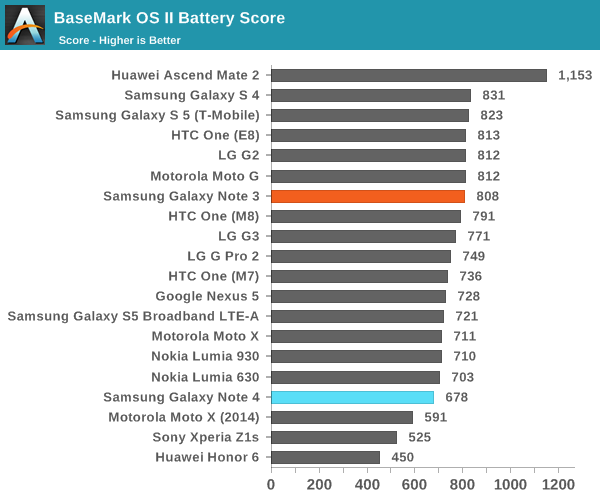
In the case of the Basemark OS II test, we see that battery life under a sustained task ends up a bit lower than we expect, which seems to suggest that in CPU-bound tasks the Note 4 doesn't have much better efficiency when compared to the Galaxy Note 3. This seems to be self-evident, as the CPUs are quite similar and the process technology used is largely similar when comparing the two devices.
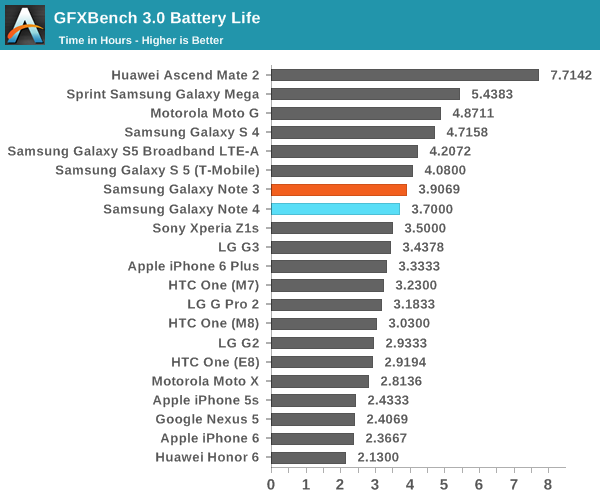
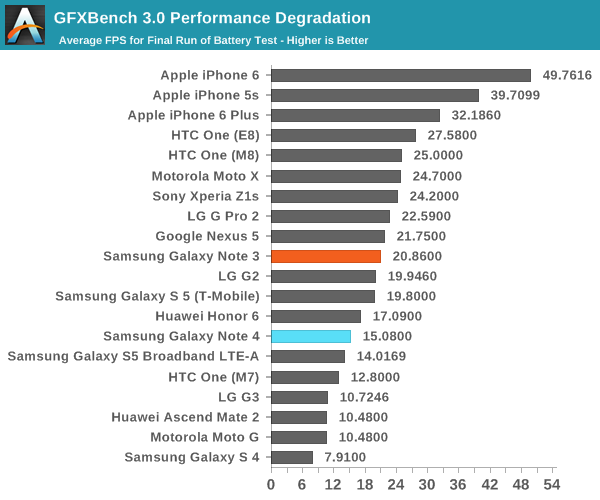
In GFXBench's endless rundown test we see that the Galaxy Note 4 trails behind in battery life when compared to the GS5 LTE-A, but looking at the end of run FPS it’s quite clear that the Galaxy Note 4’s larger surface area makes it possible to achieve greater performance.
Overall, battery life is quite good on the Galaxy Note 4. It’s a massive leap forward when compared to the Galaxy Note 3, but a relatively small one when compared to the Galaxy S5. Once again, we see that most of the benefits in battery life will come from scenarios where power draw isn’t strongly influenced by the display.
Charge Time
As a part of the overall battery life story, it's important to consider the time it takes for a battery to fully charge. If a phone's battery charges slowly then scenarios where charge time becomes crucial will severely hurt real-world battery life. For example, if one forgets to charge their phone at night, the rate at which the phone will charge the battery is a strong influence upon actual battery life. In order to test this, we measure power draw from the time that the device under test is plugged in until it reaches a given level of power draw that indicates that the battery is fully charged.
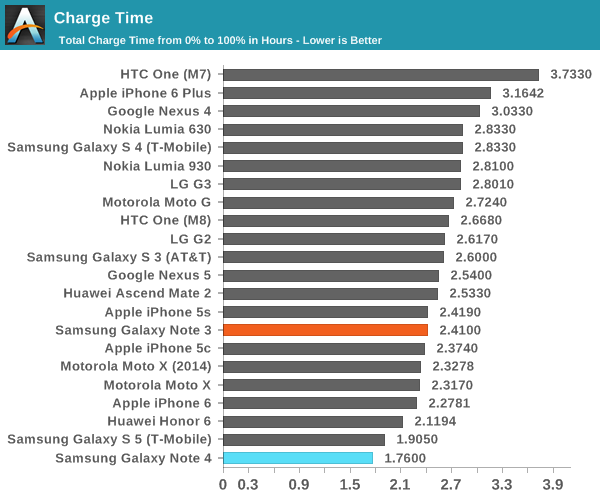
As one can see in the graph above, the adaptive fast-charge mechanism really works, although I don't see a huge benefit when compared to the Galaxy S5's charge time which was already incredibly fast. In the case of the Galaxy Note 4 it seems that it switches between a 9V, 1.64A mode and a 5V, 2A mode as needed, and most of the benefit would come from the first 50% or so of charging as power drops rapidly as the battery approaches full charge.










195 Comments
View All Comments
JoshHo - Monday, October 27, 2014 - link
As noted in the review, the Note 4 doesn't use PDAF for continuous AF so that number isn't representative of the total "AF speed" as there's significant lag between recognizing that a scene is out of focus and the start of the focus run.Drumsticks - Wednesday, October 15, 2014 - link
It really amazes me (and is a testament to their engineers) that the A8 seems to deliver near twice the IPC/per clock performance as Krait.Also: good review in general! I think phablets are too big for me, but I like keeping up with where the market likes to go.
Calista - Wednesday, October 15, 2014 - link
Fully agree, the Apple A-series are amazing. Half the frequency, half the core count, one third the memory and still the fastest SOC more often than not while still being very frugal.danbob999 - Wednesday, October 15, 2014 - link
CPU benchmarks are not designed to test the benefit of having more RAM. One could design a benchmark using 2GB RAM. The iPhone would be slower than a Galaxy S3 because it would be swapping (or even failing).Javascript benchmarks test the browser more than the CPU. That's why the iPhone 5s still performs well in these benchmarks even tough it has a very slow CPU with no ARMv8.
mudman - Wednesday, October 15, 2014 - link
Wikipedia states that the a7 in iPhone 5s is based on armv8-a.kokono - Wednesday, October 15, 2014 - link
Does this mean iPhone6+ lags when compared to the new Galaxy?melgross - Wednesday, October 15, 2014 - link
Android needs more RAM to begin with. It's not a useful comparison.tipoo - Wednesday, October 15, 2014 - link
That's true, but not to the point of making 1GB on iOS moot vs 2-3GB Android phones. It definitely swaps apps out of memory more.KPOM - Wednesday, October 15, 2014 - link
How many phone apps really use more than 1gb right now? The iPad Air 2 will have 2 GB and my guess is that the iPhone 6s will too. But for now 1GB is fine.akdj - Thursday, October 30, 2014 - link
You're entirely TOO WRONG!Lol, what crap. I've got a Note 3, specifically for my business. The 5s as my personal, daily driver. I love em both for different reasons. Especially with what we do, the stylus on the Note for when we're doing it ...& collecting the pay for it with our clients using the SPen to sign their credit card receipt.
Other than that...nope. Nothing is 'better' on the S3, 4, 5 or Note 3 than the iPhone 5s. Display preferences aside, as an owner of both, for over a year can attest to their performance. It's ridicukius realily. My Note, again being a business line doesn't have a whole lot of apps other than productivity, a couple of 'creative' types and some excellent games to kill time on sites.
Any and EVERY app in 'parity' (available on both platforms) overwhelmingly plays more fluently on the iPhone. Productivity, cloud access and any type of 'creative' apps are abound, and they're excellent ...well optimized to a single, specific type ID hardware
It's amazing to me, in a stock cold boot of a Note 3 (I've reset a couple times), it's ALREADY using 19-2.1GB of RAM! The OEM and carrier crap is a silly joke
Apps come to iOS first. Are optimized for a single platform (& able to be played for years, fluently and with updates!). Crazy, a ⅓ the RAM, twice the processors at twice the clock speed is definitely the more 'usable' system. Customizing aside, I enjoy my home screen but for seconds ...it's the apps, their design UI and ability to 'run with reliability'. That's where iOS Smokes iOS. Secondarily, it's for a vertical & horizontal system, ala OS X.
Android has Chrome
The SPIII is a nice piece. If Windows gets ohine's figures out, Samsung's screwed.
Oh, sorry. They already are!
Then there's the tablets. Windows, again ..the SPIII is special
The Air2, incredible.
There's NOT a comparable tablet running Android. Nor will Chromebooks become anything other than a home appliance.
Sorry. You certainty don't understand RAM.